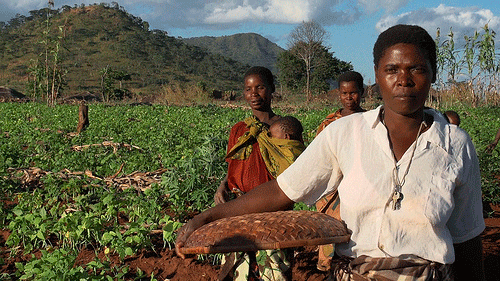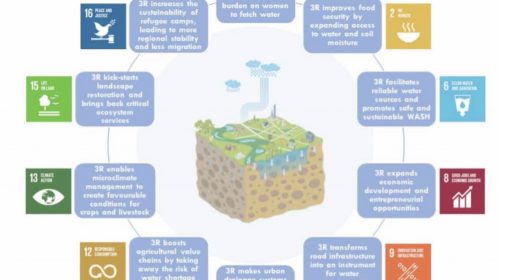posted by Frank van Steenbergen
April 22, 2013

With the large and sometimes overexposed attention for land grabbing in Africa, good examples tend to be forgotten. Here is a picture of an inspection team to a land concession issued five years earlier.
The land is in a remote part of Amhara state in Ethiopia. It is barren and windswept. The concession was given to an investor from the ‘diaspora’ community- i.e. Ethiopians who spent part of their life abroad and are often a source of investment. In the last five years he has, with moderate success, been trying to cultivate sorghum and ‘teff’ (the nutritious grass crop) on the thin soils. Part of the land concession was the obligation to protect the land and undertake catchment measures.
Here is the inspection team, consisting of representatives of several zonal offices (Agriculture, Investment, Environment), making an unannounced visit – checking whether the promises that were part of the concession have been kept. They were not: the investor admitted that he had not yet undertaken land protection measures. The issue would be settled amicably and without any pressure or back payment. The investor will make a land management plan and implement it. So this would be a very normal small event – how things ought to be and often are.
There is a bigger side to this small event. Things like this do not appear in the news and are not highlighted. What is highlighted are all things wrong or framed to be wrong. While it is good that there are watchdogs, some bark whenever and one gets the feeling that they are like mastiffs let loose. It is good to be critical, but good to be positive as well and not automatically damage a country’s reputation.
Of late, I have been reading a report called ‘Diagnosing Corruption in Ethiopia: Perceptions, Realities and The Ways Forwards for Key Sectors’. If you read the title it suggests there is much amiss, yet if you read the content there is the normal and healthy worry but also the observation that Ethiopia does much better than other countries. The question of course is why that message does not make it to the cover.
There is a section in this book on corruption in land management. The report, commissioned by World Bank and the Federal Ethics and Anti-Corruption Commission (FEACC), finds that corruption risks in land management in Ethiopia are increasing because of a weak policy and regulatory framework on land allocation, titling, and management. This gives scope for lots of local mishaps. In spite of this, there are other things that go well, such as land inspections like the one described above.
This raises another issue related tp land grabs. Often it is portrayed in conspiracy terms: of a new form of colonialism driven by newly emerging and natural resource constrained powers, trying to secure the world’s last land frontiers. However, what I observed first hand is another problem. What is often forgotten is the clumsy and dangerous opportunism in land grabs. This can be a market businessmen in Addis getting hold of several 1000’s hectares of land in a remote part of Ethiopia without having a basic clue on how to farm, or Spanish building contractors in Mauretania in the same league, trying find another pursuit with the construction industry in doldrums. Such opportunism does not necessarily create an unbalanced world, because these are the land grabs that fail. However they do much damage because in the course of the ill-planned adventures they forest, land and water resources in some still-pristine areas gets destroyed. In line with the recommendation of the ‘Diagnosing’ report, what is required is a better managed and better planned development of land, not a polarization of the issue.
{jcomments on}



